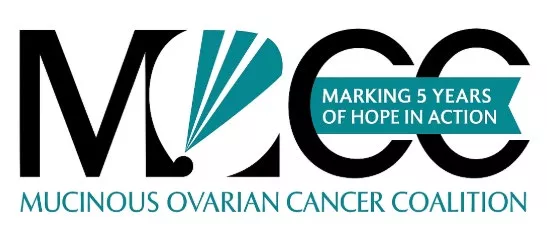Learn More About Mucinous Ovarian Cancer
We recognize that much of the information found online is technical and tough to understand for people who are not clinicians. One of MOCC’s goals is to develop easy-to-read, downloadable resources. Look for this Resource Center to expand as we grow, and research continues to evolve.
• One of These Is Not Like the Others:
A Guide to Understanding the Uniqueness of Mucinous Ovarian Cancer: Ovarian cancer is an all-encompassing term. While mucinous ovarian cancer is a rare form, we’re learning more about it every day. Including how unique it is from other types of the disease. Because the majority of the information out there is about the most common forms of ovarian cancer, we asked one of the world’s leading researchers on mucinous ovarian cancer, Kylie Gorringe, to create this guide.
Inside we explore some of the different kinds of ovarian cancer and where they originate in the body. Then we take a look at how mucinous ovarian cancer is different and what that means for a woman’s treatment.
• Our complimentary guide, When the Diagnosis Is Mucinous Ovarian Cancer, authored by one of the foremost experts on this disease, will help you figure out what to do next.
• Primary mucinous ovarian cancer: options for surgery and chemotherapy: This article reviews surgical and chemotherapy options for women with primary mucinous ovarian cancer and offers recommendations for treating women with this disease.
• Presentation and Prognosis of Primary Expansile and Infiltrative Mucinous Carcinomas of the Ovary: This important research study evaluated the evolution and prognosis of mucinous ovarian carcinomas (mOC), with respect to the two invasive patterns: expansile and infiltrative invasion.
• Multimodal diagnostic strategies and precision medicine in mucinous ovarian carcinoma: a comprehensive approach: This paper reviews the origins, diagnosis, and differential diagnosis of primary mucinous ovarian carcinoma. It highlights the need for a multimodal diagnostic approach to the disease, and advocates for the inclusion of MOC patients in clinical trials for personalized therapies.
• Mucinous Cancer of the Ovary: Overview and Current Status: This article from the National Library of Medicine explains what Mucinous Ovarian Cancer is and what we currently know about it.
• Ovarian Cancer: Epithelial Ovarian Cancer: Created by the National Comprehensive Cancer Network (NCCN), an alliance of 28 cancer centers across the country, this step-by-step guide helps patients better understand their disease, from diagnosis to staging and treatment options. Written not just for MOC but for all types of epithelial ovarian cancer, it is a helpful tool that’s easy to read.
• "Mucinous Carcinoma of the Ovary" is a helpful guide created by My Pathology Report. It covers questions commonly asked by women with mucinous ovarian cancer, including how the disease is diagnosed, infiltrative vs. expansile growth, endocervical vs. intestinal, and well differentiated vs. moderately or poorly. Among other important information, this article also discusses and displays diagrams of staging.
• NCCN Downloable Guidelines
• National Comprehensive Cancer Network (NCCN) Guides for Patients with Ovarian Cancer
Research & Treatment
• Not Sure How to Choose a Cancer Doctor? Red Flags to Look Out for: Finding the right oncologist is essential when you have a rare type of cancer like mucinous ovarian. In this great article, Dr. Diane Reidy-Lajunes from Memorial Soan Kettering breaks down red flags and green flags to watch for.
• Simple test could lead to more personalized treatment for rare ovarian cancer: This global study into mucinous ovarian cancer could help oncologists recommend the best treatment for women who are diagnosed early with the condition.
• Effects of Gastrointestinal-Type Chemotherapy in Women With Ovarian Mucinous Carcinoma: A retrospective study that reviews the outcomes for 52 women who received gastrointestinal-type chemotherapy versus a standard ovarian cancer regimen.
• More accurate diagnosis for rare ovarian cancer type on the cards, new research reveals: A great article on research that helped identify treatment markers for MOC, with hopes that further research can improve treatment options and patient outcomes.
• Does the primary site really matter? Profiling mucinous ovarian cancers of uncertain primary origin (MO-CUP) to personalise treatment and inform the design of clinical trials: This study looks at the genetic profiles of MOC and discusses the role targeted therapies may play in improving outcomes.
• Trametinib versus standard of care in patients with recurrent low-grade serous ovarian cancer (GOG 281/LOGS): an international, randomised, open-label, multicentre, phase 2/3 trial: While this research did not include mucinous ovarian cancer, there is a finding to note. The drug – trametinib – seems to work best in patients who have a tumor with a KRAS mutation and close to 50% of mucinous ovarian cancers will have that mutation.
• HIPEC seen as cutting-edge treatment for some cancer patients HIPEC is a two-part treatment option for cancers that result in peritoneal spread in coating the abdominal cavity.
• Targeted therapy for mucinous ovarian carcinoma: Evidence from clinical trials Article from Rhonda's Award 2023 Recipient, Dr. Kylie Gorringe and colleagues at Peter MacCallum Cancer Centre in Melbourn
• Impact of lymphadenectomy and intra-operative tumor rupture on survival in early-stage mucinous ovarian cancers. This article shares the results of a study of the optimal surgical management of clinical stage I mucinous ovarian carcinoma. It covers the prognostic significance of lymphadenectomy and intra-operative rupture on patient survival.
• Investigating age and ethnicity as novel high-risk phenotypes in mucinous ovarian cancer: retrospective study in multi ethnic population. This study explored how age and ethnicity impact survival in primary mucinous ovarian cancer.



















